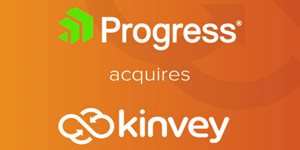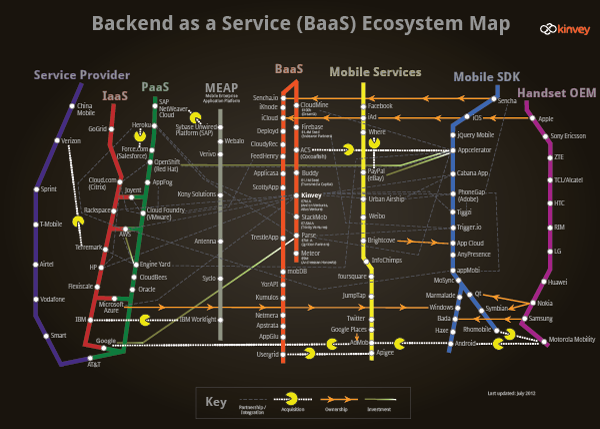Where Kinvey Sits in Progress' Cognitive-First Strategy?
As you may recall, when my coworker Laura Myers and I interviewed Progress’ CTO Dmitri  Tcherevik at the SitefinitySummit 2017 event, he made it clear that their vision is providing the best platform for the next generation of business applications. In light of this vision, Dmitri’s team is tasked to build mobile devices, big data, and cognitive-first applications powered by artificial intelligence. Fast forwarding from last May to last week, with its “cognitive-first strategy” in mind, Progress announced that it has acquired Kinvey, backend as a service (BaaS) technology provider, for $49 million in cash. Hot on the heels of the acquisition, I reached out to Yogesh Gupta, who was named Progress's chief executive in October, to inquire about what the acquisition of Kinvey means for Progress.
Tcherevik at the SitefinitySummit 2017 event, he made it clear that their vision is providing the best platform for the next generation of business applications. In light of this vision, Dmitri’s team is tasked to build mobile devices, big data, and cognitive-first applications powered by artificial intelligence. Fast forwarding from last May to last week, with its “cognitive-first strategy” in mind, Progress announced that it has acquired Kinvey, backend as a service (BaaS) technology provider, for $49 million in cash. Hot on the heels of the acquisition, I reached out to Yogesh Gupta, who was named Progress's chief executive in October, to inquire about what the acquisition of Kinvey means for Progress.
“We couldn’t be more excited about bringing Kinvey into the Progress family,” Yogesh Gupta told CMS-Connected. “The acquisition gives us the only full-stack open platform for building and deploying modern business applications and is the perfect fit to help us deliver on our vision for modern application development.”
To better understand how Kinvey will sit in Progress’ cognitive-first strategy, first, let’s look at the startup’s profile and offerings. Boston, Massachusetts-based Kinvey was founded in 2010, runs over 31,000 applications on its cloud, with over 100 million end users and serves over 10 billion API calls per month. That includes consumer and business apps for insurance, manufacturing, and media companies, as well as HIPAA-compliant apps for healthcare. The software serves to Schneider Electric, VMware, Bell and Howell, and Thomas Jefferson University and Jefferson Health, just to name a few. The company has raised nearly $18 million since 2011 from investors including Atlas Ventures, Verizon Ventures, NTT DOCOMO Ventures, Avalon Ventures, and others.
What Makes Kinvey Special in the MDP Space?
Kinvey was an early pioneer in the backend-as-a-service platform space and its platform makes it easy for developers and enterprises to build and run cloud back-ends for their mobile, tablet and web apps. Back-end means the software on the server side of applications and takes care of everything from analytics and user authentication to databases and libraries that an app needs to communicate. Coding in such complex environment is not an easy task. That being said, Kinvey’s platform is designed to make the process less intimidating as it handles connecting to various cloud services or enterprise backend systems, setting up servers for their backend, and maintaining and scaling them, so app developers could spend more time on the unique, customer-facing features of their apps and less time on the infrastructure. In other words, developers only need to meet their cloud back-end needs while Kinvey auto-generates the APIs they would need to access data from any device. From there, developers gather their APIs and connect to them directly or through native iOS, Android and JavaScript libraries provided by Kinvey. Additionally, as Kinvey manages its platform across different cloud providers, if one starts dysfunctioning, your app stays up.

Kinvey has been named a Leader in "The Forrester Wave: Mobile Development Platforms, Q4 2016." More importantly, the vendor received the highest score for its current offering among the 12 vendors considered by Forrester in its 32-criteria evaluation. Today, huge tech players like Microsoft, Apple, Google, and Amazon all offer some sort of a backend service for mobile developers. However, in being a startup, competing with these tech titans, and in fact, even beating out the likes of Amazon and Oracle is a remarkable success.
The market research firm stated in the report: “Kinvey’s vision for this space (Mobile Development Platforms) is on par with the most forward-looking and aggressive companies in the market. The platform accelerates developer output and is now putting heavy focus on doing the same for operations teams with advanced analytics, termed 'operational intelligence.' Kinvey’s road map backs this strong vision.”
Prior to Forrester’s recognition, the vendor announced its platform has been awarded a patent for providing unified access to data through virtualised services. “Our customers rely on us to be the most comprehensive, secure, and flexible platform available to help them deliver five star quality applications,” said Sravish Sridhar, the CEO of Kinvey, “Our commitment to delivering advanced MBaaS capabilities that no other vendor provides is a testament to our continued leadership in this space.”
What Makes Kinvey a ‘Perfect Fit’ in Progress’ Strategy?
Progress, a 36-year-old publicly traded company, believes that Kinvey is a perfect fit to enable Progress to deliver on their vision for modern application development. This explains why Progress went beyond its initial intention on becoming an investor in the new financing round Kinvey was looking to raise and how both parties have seen the value in having a tighter alliance. There are many obvious reasons why this relationship could work.
For one, even though Progress has already offered backend application services, those offerings were not as robust as Kinvey’s capabilities. Considering the mobile application development field has lately been a rising star for, especially, big tech companies like Facebook, who bought Parse in 2013; EBay, who acquired Stackmob; and Redhat, who bought FeedHenry, there is a clear benefit of adding mobile app development talents, from Progress’ perspective. Secondly, with Forrester’s recognition, the startup proved that it has a very-well established power in the space that could take on behemoths like Amazon and Microsoft.
From the customer standpoint, though, one of the things that Kinvey and Progress together will provide is an unparalleled developer experience for building and deploying modern enterprise applications for mobile, web and IoT. Kinvey's powerful backend platform complements Progress’ own frontend development tools, so while Progress’ customers develop the consumer-facing experience of apps, they also run apps that integrate with enterprise systems. In other words, the integration will provide users with more comprehensive, cutting across front-end and backend tools. In addition to these, here is a brief rundown of what Kinvey brings to Progress:
-
Kinvey’s Backend platform provides the open, serverless foundation for Progress’s cognitive-first application platform strategy.
-
Kinvey provides built-in HIPAA compliance for healthcare apps and a focus more generally on compliance that provides benefit across industries.
-
Kinvey works well with Progress’ frontend development tools including, NativeScript for native mobile development, and Kendo UI the leading tool for easily building responsive web apps.
-
Kinvey also integrates well with Progress’ data connectivity capabilities in DataDirect which customers use for secure and performant access to data from any enterprise or cloud source.
Speaking of integration, The Kinvey acquisition comes on the heels of the company’s acquisition in March of machine learning and predictive analytics vendor, DataRPM that teaches software to detect when someone intends to use the application before they open it. Progress is planning to integrate Kinvey and DataRPM so customers can develop apps that also take advantage of machine learning. Both acquisitions and their integrations is part of the strategy to expand its footprints into cognitive and IoT (Internet of Things) mobile application markets as Gupta believes, "artificial intelligence and machine learning will be essential in applications moving forward.”
Under the deal, Kinvey will keep the company's 40 employees in its current downtown location, and the joint organization will employ about 1,700 people in total. Lastly, what Progress brings to Kinvey is obviously a large investment round that will help Kinvey expand its team by 30-40 percent in the near future, along with stronger credibility.
My POV
Even though Progress’ core portfolio has been very-well established in the market, the vendor had been lagging behind its rivals when it comes to offering more robust application development tools powered by the artificial intelligence technologies. However, the cognitive-first strategy led by its CEO Yogesh Gupta seems to be helping Progress catch up to the stiff competition. Therefore, the two recent acquisitions are playing a key role in gluing those missing pieces in the puzzle of providing the best platform that enables building and managing modern cognitive-first applications. It is too early to tell whether Kinvey will share the same fate with Parse and Stackmob under Progress’ management as Facebook and eBay shuttered those teams subsequent to the acquisitions. However, it is safe to say the benefits of the deal for both parties are loud and clear thus it will be an exciting journey on many levels.

Venus Tamturk
Venus is the Media Reporter for CMS-Connected, with one of her tasks to write thorough articles by creating the most up-to-date and engaging content using B2B digital marketing. She enjoys increasing brand equity and conversion through the strategic use of social media channels and integrated media marketing plans.